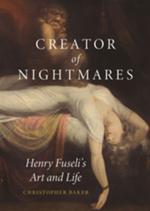Henry Fuseli (1741-1825) was one of the eighteenth century’s most provocative and inventive artists. He is best known for his painting The Nightmare, which created a new form of terrifying gothic imagery for the Romantic age. This engaging study of the artist’s career unveils Fuseli’s complexities, navigating contradictions between literary and painted works, sacred and secular themes, and traditional patronage versus the new era of competitive exhibitions and intense criticism. Plotting Fuseli’s trajectory from Zurich to Paris, Rome and ultimately London, where he secured long-lasting fame, the artist is revealed as an astute publicity seeker and self-proclaimed genius who transformed himself from a priest to an Enlightenment writer, a ‘mad’ mercurial force in the art world, and finally a revered teacher.

Creator of nightmares : Henry Fuseli’s art and life
ISBN: 9781789149302
Format: Hardback
Publisher: Reaktion Books (ADS)
Origin: GB
Release Date: March, 2025


